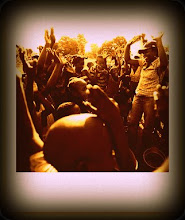The Mai Mai (corruption of the Swahili term for ‘water water’) sprinkle themselves with water that has been endued by sorcerers’ powers. The Mai Mai believe that when attacked and shot at, this magical water makes bullets fall harmlessly to the ground. There is enough evidence, at least locally, that Mai Mai fighters are invincible in battle, only if they’ve doused themselves with this water. As you can imagine these beliefs make the Mai Mai an especially fearless, and according to some sources, vicious fighters. In fact, the Mai Mai have secured mining areas for illegal extraction of gold and have committed many atrocities against civilians throughout the Kivus. Not the kind of people you want to run into in the forest.
Through a series of events that are beyond my understanding, there is a village not far from Bukavu which believes that there is a Mai Mai goat in their midst. Allegedly this Mai Mai goat roams freely throughout the village, eating people’s crops and other valuables, and is effectively invincible. The people in the village are afraid to slaughter it for food (the fate of many goats in the developing world) for fear that it would be impervious to bullet and blade, and somehow retaliate. Perhaps we’ve been misinformed, but this seems to be a regular sized goat, nothing especially large or intimidating about it. Perhaps its beard is longer than other village goats or it blankly stares with an exceptional intensity while it masticates its choix de la moment. Nothing too scary about any of that. One thing is for certain, by doing what goats do best – essentially eating everything within mouth and hoof distance, (and getting away with it) – this goat has become as bold as a lion. Who knows, maybe this goat actually is a Mai Mai and would liquefy any attempt to kill it. Or perhaps a local has had a bit too much to drink and fabricated this myth with enough gumption to convince others. Either way you look at it, this is one lucky goat.
Just a normal goat?


